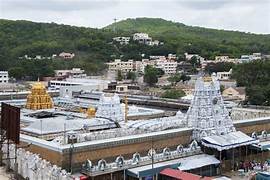The Tirumala Temple, officially known as the Venkateswara Temple, is a prominent Hindu temple located on Tirumala Hill near Tirupati in Andhra Pradesh, India. It is dedicated to Lord Venkateswara, an incarnation of Vishnu, and is one of the most visited and revered pilgrimage sites in the world.
Key Features
Location: The temple is situated on the Tirumala Hills, which are part of the Seshachalam range. The site is approximately 800 meters above sea level, and devotees often undertake a pilgrimage up the hill, either by walking or by vehicle.
Main Deity: The central deity of the temple is Lord Venkateswara, also known as Balaji, Srinivasa, and Govinda. The idol of Venkateswara is made of a mix of metals and is adorned with precious jewels. The deity is depicted with a prominent nose and a beard, which are distinctive features.
Architecture: The temple is an example of Dravidian architecture and features a large gopuram (gateway tower) that stands about 50 meters tall. The main sanctum (garbhagriha) houses the deity’s idol, and the temple complex includes several other shrines, halls, and courtyards. The architecture is characterized by intricate carvings and elaborate decorations.
Seva and Offerings: The Tirumala Temple is renowned for its elaborate rituals and offerings. Devotees offer various types of Sevas (services), including the famous hair tonsuring (tonsure) ritual, where pilgrims shave their heads as a form of offering to the deity. The temple also receives vast donations, which are used for the upkeep of the temple and charitable activities.
Historical and Cultural Importance
Ancient Tradition: The Tirumala Temple has a rich history, with evidence of worship at the site dating back over a thousand years. The current temple structure, however, was significantly expanded and renovated during the Vijayanagara Empire, particularly under the patronage of the Vijayanagara kings.
Pilgrimage: The temple is a major pilgrimage site for Hindus, attracting millions of devotees annually. The pilgrimage to Tirumala is considered highly auspicious, and the temple’s rituals and festivals are celebrated with great fervor.
Festivals: The temple hosts several significant festivals throughout the year, including the Brahmotsavam, a grand annual festival that lasts for nine days and involves elaborate processions, rituals, and cultural events.
Current Status
The Tirumala Temple remains an active center of worship and is managed by the Tirumala Tirupati Devasthanams (TTD), a trust responsible for the administration and upkeep of the temple. The temple’s infrastructure has been modernized to accommodate the high volume of pilgrims, and various facilities are provided to ensure a smooth pilgrimage experience. Despite its modernization, the temple continues to be a major spiritual and cultural landmark, deeply cherished by devotees from across the world.


